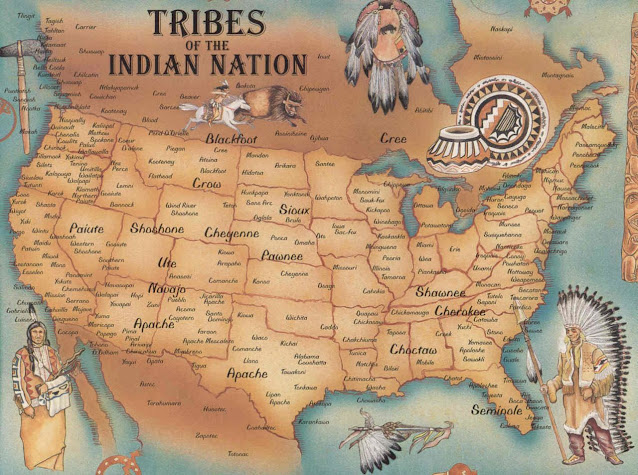Ancient to Contemporary and Tribal Maps and Communities
At RootsTech this week Roberta Estes spoke on Native American DNA Ancient and Contemporary Maps. It must be stressed that where records are not extant, the ancient DNA still exits. It tells us the story of our ancestors prior to the records. But I digress.
At a3Genealogy we recently did a large Native
American job. We were able to learn much through both the Y-DNA and the
Mitrochodrial DNA haplogroups. At least
we learned of the migratory path as supported in academic and scientific
papers.
Am I Native American?
What is the significance of the
haplogroup?
Where to Begin
When the a3Genealogy Question Bag receives this line of questioning,
we direct the family researcher to the FamilySearch wiki article, Finding
Your US Indigenous Ancestor. And
then, we share with them articles, videos and presentations that may assist in
their DNA discoveries.
Native American Y-DNA
Let’s start with your Y-DNA haplogroup. You recognize it
was an O - the newest of
the Y-DNA Native American haplogroup.
What’s interesting is that Native Americans are a subset of haplogroup C
and Q, also, which also represent European heritage. But some charts are just
befuddling. How can I be “Q Not Native?”
And why would my Y-DNA results have the option of “Possible Native on
Autosomal.”
Might I warn you that DNA is not static. New discoveries are shaping haplogroups and out applications to recreating our ancestors’ migration patterns and makeup.
According to FamilyTreeDNA, here are known Native American
Y-DNA Haplogroups.
(Click links below to learn more of each.)
Haplogroup
Q-M3
Haplogroup Q-M346
Haplogroup Q-P89.1
Haplogroup Q-MEH2
Haplogroup Q-NWT01
Haplogroup Q-SA01
Haplogroup C-P39
Haplogroup C-M217
Without disrupting belief systems, did you know the Q subclade’s earliest haplogroup is identified have existed about 12.5K years in Montana? Hmmm. Now, we are only talking the Native American subclades here, not Scandanian Q. The main message we get from some of these maps and haplogroups is that we must be cautious when working with haplogroups for Native Americans, as these same haplogroups may represent European That opens up so many more questions.
Native mtDNA
Known Native American haplogroups are the following with
mitochondrial (mtDNA): Haplogroups
A, B, C, D and X. But
like his Y-DNA “counterpart” not all subgroups in each main haplogroup are Native
-American Indian” (FamilytreeDNA). For example: the pie chart below Pie chart hows the proportions of Indigenous American haplogroups & other contributions to the Mexican mtDNA pool.
 |
See text for details. Image: The Mitochondrial DNA Landscape of Modern Mexico. |
Many find it also particularly interesting that an "F" mtDNA has not yet been uncovered; but yet there F1a1 and F1a1a haplogroups have been identified. This new haplogroup is tagged as Native in Asia and Polynesia.
How to Use This
Information
This blog post
was inspired by Roberta Estes’s RootTech presentation of 3 Mar 2022 where she shared
migratory ancient Native American migration related maps. For example, Mitochondrial (mtDNA) Haplogroup B2 was found
in Alaska. but it migrated to Brazil and
Peru. What’s of keen interest is the comparing of these ancient maps to contemporary maps in the New World.
Here are the major points. To sum it up how analyze your DNA ancestry comparing ancient haplogroup discoveries and maps to our contemporary DNA results and settlements on maps.
- test, test, test, to include cousins on the line . If it’s Y-DNA you will want the Y-DNA Big 700 2) you identify your haplogroup of interest
- reference the ancient and contemporary maps as offered
- using Estes’ book look up the associated maps.
- review the RootsTech presentation given by Roberta Estes, Native American DNA - Ancient and Contemporary Maps as a reference to the associated Native American tribes, tribal association, and communities (both ancient and contemporary) for your Haplogroups of interest.
More Reading?
Here is an article,
16 Jan 2022, about Este’s newly published book: DNA
for Native American Genealogy Book Published
At a3Genealogy, our In-Genes DNA Team try to stay abreast with the work of Jennifer Raff who studies ancient DNA. Read ‘Origin’ explores the controversial science of the first Americans, published in ScienceNews.
As we say at a3Genealogy… “Dig Deep!”
Be Historically Correct
Kathleen Brandt
a3genealogy.com
Accurate Accessible Answers
a3genealogy@gmail.com



No comments:
Post a Comment